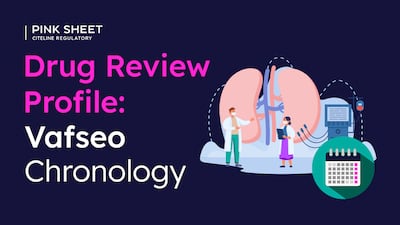United States
Revised recommendation is based on most recent data on circulating strains in US, where KP.3 is now dominant. Novavax sticks with plans targeting the JN.1 ‘parent strain.’
With the deadline for comments on the US FDA’s draft guidance less than a month away, the Pink Sheet offers an infographic outlining what the agency is expecting in diversity action plans and when that might be implemented.
Cardiovascular and Renal Drugs Advisory Committee will consider whether open-label extension data from a randomized trial that failed its primary endpoint, along with a historical control comparison, are enough to support approval in the ultra-rare disease.
Recent ODAC meetings suggest the FDA will expand focus beyond applications with pending approval decisions to refining trial designs and drug labels for competitors.
The agency also should explain the potential consequences for sponsors if enrollment goals are not met, stakeholders say in comments on the DAP draft guidance. Some commenters urged the FDA to apply waiver criteria flexibly, especially for rare diseases.
The US FDA Commissioner pushed for a rebalancing of the US’s pharmaceutical supply chains while also stressing that there is a role for US-China commerce that would be risky to compromise.
The US FDA commissioner also said the hub is looking for an executive director who will work with the CBER and CDER heads, who will serve as co-leads.
The FDA and sponsors of two new accelerated approval drugs for PBC have taken steps in study design, initiation and reporting transparency to ensure timely completion; Intercept’s COBALT trial of obeticholic acid was negatively impacted by product safety labeling changes and a high crossover rate to commercial drug.
Long-term follow-up requirements have taken a conservative approach but could be ripe for re-examination and global harmonization given the years of experience with the products, Kite Pharma executive director says; former FDA gene/cell therapy office head Wilson Bryan calls for elimination of the classwide REMS.
Alternatives to the top pharmacy benefits managers argue health plan-PBM integration is leading to anti-competitive tactics that make it impossible for some employers to switch PBMs.
The UK regulator approved 16 medicines containing a new active substance in the first half of this year, while the European Commission issued marketing authorizations for 20 NAS-containing drugs.
HTA Regulation: EU Publishes Guidance On Validity Of Clinical Studies For Joint Clinical Assessments
Joint clinical assessment reports must be descriptive rather than reach definitive conclusions, and must not interfere with national decision making processes, according to new EU guidance.
Under current law, drugs or biologics must receive rare pediatric disease designation before 1 October to be eligible for a priority review voucher. The sunset provisions have led to a spike in designation requests at the FDA and a push by pediatric and rare disease advocates for an extension, either through a continuing resolution or reauthorizing legislation.
The Pink Sheet Drug Review Profile explores the US FDA’s approval of vadadustat to treat anemia in chronic kidney disease patients on dialysis. A complete response letter cited the risk of drug-induced liver injury, but postmarketing data from Japan reassured reviewers.
An effort to change the US Food and Drug Administration’s conclusion that its obesity treatment candidate retatrutide is a drug and not a biologic could give the product more time with unrestricted pricing in Medicare, among other benefits.
The Pink Sheet’s Drug Review Profile looks at the timeline behind the development and US FDA approval of Akebia’s Vafseo, a treatment for anemia in chronic kidney disease patients on dialysis.
The agency’s plan for advanced manufacturing seeks more harmonization, while also seeking to codify internal practices with guidance and training.
AbbVie’s migraine ad overstates the drug’s benefit, a problem that is amplified by using a celebrity, the agency says.
A real-world evidence study also does not meet the regulatory standard for an adequate and well-controlled clinical investigation, the agency said. The FDA should allow the accelerated approval drug to remain available like other treatments that failed their confirmatory trials, Intercept said.
















